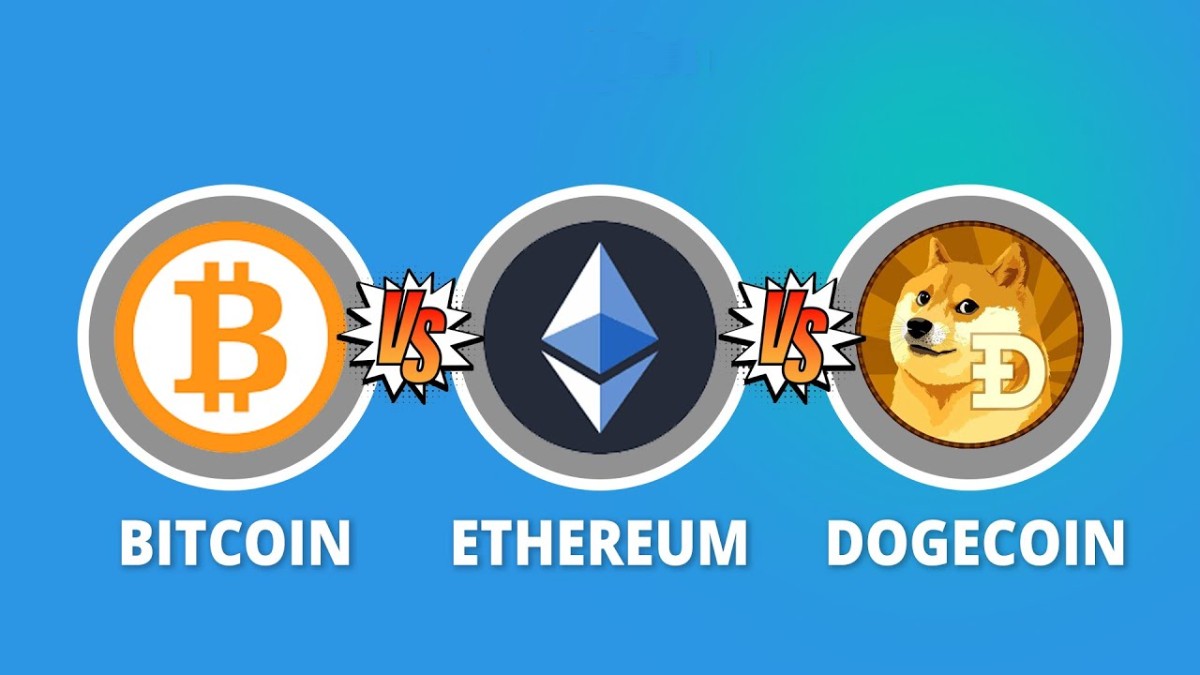
Cryptocurrencies are booming once more after a difficult 2022 and most of 2023. Bitcoin, Ethereum, and—perhaps surprisingly—Dogecoin are a few of the most well-known digital currencies.
All cryptocurrencies share certain characteristics, but what distinguishes these three well-known ones from one another? These are a few of the most notable differences—there are actually quite a few.
Blockchain technology is used in the creation of cryptocurrencies. It creates, tracks, and manages digital currency via a distributed ledger. Consider it akin to an ongoing digital receipt that tracks all currency transactions, including the ownership and amount of each item.
A decentralized network of computers is continuously verifying this “receipt,” assisting in preventing fraud and guaranteeing the correct operation and accounting of the currency.
The intention is to do away with a traditional central bank’s involvement in the production, transfer, and distribution of money.
Strong computers are known as “miners” and “mine” cryptocurrencies by carrying out difficult mathematical operations to produce coins. By handling currency transactions, they also receive coins.
There are thousands of cryptocurrencies in use today, and with comparable blockchain technology, any quantity could be produced. Users of cryptocurrencies can transfer money somewhat anonymously, but the IRS and FBI are becoming more adept at monitoring transactions and freezing accounts.
Three names are frequently mentioned when you first start learning about cryptocurrencies: Dogecoin, Ethereum, and Bitcoin. Each coin attracts investors for a different reason, so it would be incorrect to combine the three most well-liked cryptocurrencies into one cohesive unit.
The main differences between Dogecoin, Ethereum, and Bitcoin are enumerated in the table below.
| Bitcoin | Ethereum | Dogecoin | |
|---|---|---|---|
| Symbol | BTC | ETH | DOGE |
| Year developed | 2009 | 2015 | 2013 |
| Initial purpose | Created to be used as a currency or store of value | Created to sell processing power of the decentralized network | Created as a joke spoof of Bitcoin and the doge meme |
| Approximate market capitalization* | $1.3 trillion | $388.8 billion | $23.5 billion |
| Number of coins* | 19.68 million | 120 million | 143.9 billion |
| Maximum number of coins | 21 million | Unlimited, but issuance is fixed | Unlimited, but yearly issuance limited to 5 billion coins |
These three cryptocurrencies were developed with distinct goals in mind. Notably, Dogecoin was a parody of the doge meme, which starred a charming Shiba Inu, and the growing popularity of Bitcoin. However, the more serious and quixotic goals behind the creation of Ethereum and Bitcoin were to facilitate transactions and lay the groundwork for the entire cryptocurrency ecosystem.
There is a significant difference in each market capitalization, which is calculated by multiplying the total number of coins in circulation by the current trading price. According to CoinMarketCap, Dogecoin is among the top 10 cryptocurrencies, and Ethereum is a distant second. Bitcoin is by far the largest. The most well-liked cryptocurrencies attract the largest concentration of traders, and volume sharply declines below the top 20.
Although these currencies are among the most well-liked by traders, Bitcoin is the one that has gained traction with the general public. The recent approval of a Bitcoin ETF, which allows investors to get exposure to the cryptocurrency inside a traditional brokerage account, is just one of the many ways that accessing Bitcoin is becoming easier. Of course, traders can purchase a variety of cryptocurrencies by using well-known apps.
The number of coins that can be issued in each cryptocurrency is also important to know. Due to its strict issuance limit of just 21 million coins, Bitcoin has attracted a lot of traders. With money pouring into Bitcoin and demand growing, this fixed limit practically guarantees that the price will increase over time. For traders, that might be advantageous, but as a currency, Bitcoin is more difficult to use due to its volatility.
Ethereum, on the other hand, has an unrestricted issuance schedule that might impede the creation of new coins. Part of the joke is that Dogecoin can be produced indefinitely in the meantime. The currency increased dramatically in 2021—from less than a half-penny a coin on January 1 to more than $0.60 in May—despite the unlimited issuance. But throughout 2021 and well into 2022, the coin had a declining trend.
Knowing that not all cryptocurrencies are made equal is important if you’re thinking about trading them. One currency may be more appealing than another due to certain characteristics, such as the limited supply of Bitcoin, at least in the long run. However, sentiment drives cryptocurrency in the short run, so even a joke with infinite issuance has the potential to rally strongly if demand for it increases. “Much wow,” to use the words of a well-known doge meme.
Liverpool, UK—House of Spells and Comic Con Liverpool are once again collaborating to bring the… Read More
Introduction In India's booming EdTech space, there's one name that's making waves among Telugu students… Read More
In litigation, often, the difference between winning and losing comes down to strategy. Although facts… Read More
Instagram creators now have a new tool to try if they're searching for a free… Read More
A free tool to help you boost local SEO and attract more clients is your… Read More
In today’s fast-paced digital world, online shopping has become more than just a convenience, it's… Read More